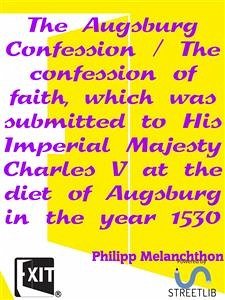PREFACE TO THE EMPEROR CHARLES V.
Most Invincible Emperor, Caesar Augustus, Most Clement Lord: Inasmuch as Your Imperial Majesty has summoned a Diet of the Empire here at Augsburg to deliberate concerning measures against the Turk, that most atrocious, hereditary, and ancient enemy of the Christian name and religion, in what way, namely, effectually to withstand his furor and assaults by strong and lasting military provision; and then also concerning dissensions in the matter of our holy religion and Christian Faith, that in this matter of religion the opinions and judgments of the parties might be heard in each other's presence; and considered and weighed among ourselves in mutual charity, leniency, and kindness, in order that, after the removal and correction of such things as have been treated and understood in a different manner in the writings on either side, these matters may be settled and brought back to one simple truth and Christian concord, that for the future one pure and true religion may be embraced and maintained by us, that as we all are under one Christ and do battle under Him, so we may be able also to live in unity and concord in the one Christian Church.
And inasmuch as we, the undersigned Elector and Princes, with others joined with us, have been called to the aforesaid Diet the same as the other Electors, Princes, and Estates, in obedient compliance with the Imperial mandate, we have promptly come to Augsburg, and—what we do not mean to say as boasting—we were among the first to be here.
Accordingly, since even here at Augsburg at the very beginning of the Diet, Your Imperial Majesty caused to be proposed to the Electors, Princes, and other Estates of the Empire, amongst other things, that the several Estates of the Empire, on the strength of the Imperial edict, should set forth and submit their opinions and judgments in the German and the Latin language, and since on the ensuing Wednesday, answer was given to Your Imperial Majesty, after due deliberation, that we would submit the Articles of our Confession for our side on next Wednesday, therefore, in obedience to Your Imperial Majesty's wishes, we offer, in this matter of religion, the Confession of our preachers and of ourselves, showing what manner of doctrine from the Holy Scriptures and the pure Word of God has been up to this time set forth in our lands, dukedoms, dominions, and cities, and taught in our churches.
Most Invincible Emperor, Caesar Augustus, Most Clement Lord: Inasmuch as Your Imperial Majesty has summoned a Diet of the Empire here at Augsburg to deliberate concerning measures against the Turk, that most atrocious, hereditary, and ancient enemy of the Christian name and religion, in what way, namely, effectually to withstand his furor and assaults by strong and lasting military provision; and then also concerning dissensions in the matter of our holy religion and Christian Faith, that in this matter of religion the opinions and judgments of the parties might be heard in each other's presence; and considered and weighed among ourselves in mutual charity, leniency, and kindness, in order that, after the removal and correction of such things as have been treated and understood in a different manner in the writings on either side, these matters may be settled and brought back to one simple truth and Christian concord, that for the future one pure and true religion may be embraced and maintained by us, that as we all are under one Christ and do battle under Him, so we may be able also to live in unity and concord in the one Christian Church.
And inasmuch as we, the undersigned Elector and Princes, with others joined with us, have been called to the aforesaid Diet the same as the other Electors, Princes, and Estates, in obedient compliance with the Imperial mandate, we have promptly come to Augsburg, and—what we do not mean to say as boasting—we were among the first to be here.
Accordingly, since even here at Augsburg at the very beginning of the Diet, Your Imperial Majesty caused to be proposed to the Electors, Princes, and other Estates of the Empire, amongst other things, that the several Estates of the Empire, on the strength of the Imperial edict, should set forth and submit their opinions and judgments in the German and the Latin language, and since on the ensuing Wednesday, answer was given to Your Imperial Majesty, after due deliberation, that we would submit the Articles of our Confession for our side on next Wednesday, therefore, in obedience to Your Imperial Majesty's wishes, we offer, in this matter of religion, the Confession of our preachers and of ourselves, showing what manner of doctrine from the Holy Scriptures and the pure Word of God has been up to this time set forth in our lands, dukedoms, dominions, and cities, and taught in our churches.









